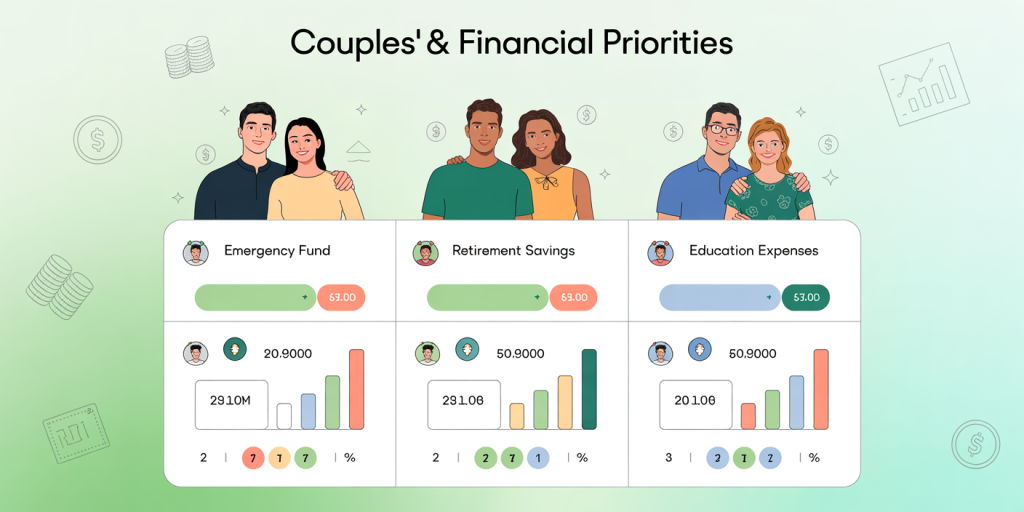Money is one of the most common sources of conflict in relationships. According to a 2023 study by the American Psychological Association, financial stress is cited as a major reason for relationship dissatisfaction in over 35% of couples surveyed. Despite its importance, discussing finances can often lead to tension, misunderstandings, or even arguments. However, with the right approach, money conversations can enhance mutual understanding and strengthen your bond.
When addressed with openness and respect, financial discussions become opportunities for growth. This guide will explore effective strategies for talking about money with your partner without fighting, backed by real-world examples, relevant data, and practical advice to foster harmony and shared financial success.
Understanding Each Other’s Money Mindsets
One of the first steps toward productive money conversations is understanding your partner’s financial mindset. People’s attitudes toward money are shaped by their upbringing, personal experiences, and cultural background. Recognizing these differences helps prevent misunderstandings and reduces emotional triggers during discussions.
For example, imagine Sarah grew up in a household where saving was prioritized because resources were scarce, while her partner Tom’s family constantly emphasized spending to enjoy life. When Sarah suggests putting money aside each month, Tom might feel restricted or accused of being reckless. The key is to identify and acknowledge these perspectives without judgment.
A practical method to uncover money mindsets is to ask open-ended questions such as, “What are your earliest memories about money?” or “What does financial security mean to you?” Having these conversations early in the relationship decreases the chance of defensive reactions later and builds empathy.
Setting Common Financial Goals Together
Couples who establish shared financial goals are more likely to experience satisfaction and cooperation. In a 2022 survey by Fidelity Investments, 70% of couples who set joint financial targets reported higher trust and reduced arguments related to money.
Start by discussing both short-term and long-term goals. For example, you might want to save for a vacation in six months or plan for retirement in 30 years. Writing these goals down creates accountability and clarity. Consider categorizing the goals based on urgency and importance—this way, both partners feel heard.
Here is a comparative table illustrating how different couples prioritize financial goals differently:
| Couple Type | Short-Term Priority | Long-Term Priority | Outcome |
|---|---|---|---|
| Example 1: Young Professionals | Building emergency fund | Saving for home purchase | Balanced approach, steady progress |
| Example 2: Retirement-focused | Paying off credit cards | Maximize retirement savings | Debt reduction leads to higher future security |
| Example 3: Family with Kids | Covering daily expenses and education | College fund and estate planning | High stress, necessitates regular reviews |
Aligning your goals does not require identical priorities; it needs compromise and mutual respect. By agreeing to revisit goals quarterly or semi-annually, couples can adjust plans as life circumstances change.

Creating a Transparent Budget to Boost Trust
Budgeting is often associated with restriction, but when done collaboratively, it promotes transparency and shared accountability. According to a 2021 study from the National Endowment for Financial Education, couples who budget together report 30% fewer money-related arguments.

Begin by tracking income, expenses, debts, and savings accurately. Tools like Mint or You Need a Budget make this process easier and accessible for couples. Consider setting spending limits for discretionary categories, such as dining out or entertainment, while agreeing on essential bills and savings contributions.
Real-life example: Mia and Jordan struggled with fights about unplanned purchases. After implementing a joint budget with a $100 monthly “personal spending” allowance each, conflicts reduced significantly. The separate discretionary budgets gave them autonomy while preserving the partnership’s financial health.
Transparent budgeting also helps uncover blind spots. For instance, one partner may unknowingly carry debt or have subscriptions not shared with the other. Openly discussing these issues early prevents resentment and surprises.
Approaching the Conversation with Empathy and Timing
Emotions run high when discussing money as it touches on security, values, and sometimes identity. Choosing the right time and tone for these talks is crucial to avoid clashes.
Avoid discussing finances during stressful moments like right after work or during an argument. Instead, schedule a calm, distraction-free timeframe. One practical tip is to treat money talks as you would any important meeting—set an agenda, keep discussions fact-based, and use “I” statements to express feelings. For example, say “I feel anxious about our spending” instead of “You always waste money.”
Using empathetic language promotes understanding rather than blame. Remember that money anxieties or mistakes do not define your partner’s character but reveal areas for teamwork.
Real case: Carlos and Amanda initially fought whenever finances were mentioned. After consulting a financial therapist, they learned to use reflective listening—repeating back what the other said to confirm understanding. This technique decreased misunderstandings and improved patience during talks.
Utilizing Professional Help When Needed
Sometimes, despite best efforts, money discussions remain difficult or escalate into recurring fights. Seeking help from a professional, such as a financial counselor or couples therapist specialized in financial issues, can provide an objective and skilled perspective.

Certified Financial Planners (CFPs) can help design a financial plan tailored to your collective needs, while therapists address underlying emotional causes of money conflicts. For instance, fears around financial insecurity often trigger defensive behaviors that only trained professionals can navigate effectively.
Data from the Financial Therapy Association shows that couples who engage in financial therapy report a 40% improvement in relationship satisfaction and better money management habits after a few sessions.
When choosing a professional, look for credentials and experience with couples’ finances. Preparing questions and discussing expectations upfront maximizes the value of sessions.
Looking Ahead: Building a Financially Resilient Partnership
Money is an evolving topic as life circumstances change—whether through career shifts, having children, or retirement. Viewing financial conversations as ongoing rather than one-time events helps maintain harmony and resilience.
Technology and financial innovations offer new ways for couples to stay aligned. Shared financial apps, automatic savings plans, and joint accounts can simplify cooperation. Moreover, educating yourselves continually about money management is empowering—attending finance workshops or reading credible books together can strengthen your partnership.
The future of successful couples involves adaptability. Regularly reviewing your financial situation and goals ensures you respond proactively to changes. Importantly, fostering a culture of mutual respect and openness about money prevents resentment and isolation.
For example, couples who review finances monthly and use joint goal trackers reported 25% higher satisfaction in a 2023 survey by the Couples Finance Institute.
By investing time and effort to communicate effectively about money, you lay the foundation for a strong, united future.
Navigating money conversations with your partner need not be a battleground. With empathy, clear communication, shared goals, and sometimes professional guidance, you can transform financial talks into a source of connection and growth. Implementing these approaches fosters not just financial stability but also deeper trust and partnership.

Deixe um comentário